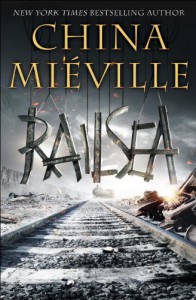 I find myself without a great deal to say about Railsea.
I find myself without a great deal to say about Railsea.I certainly liked it. China Miéville is one of my favorite authors and I have yet to be disappointed in anything of his I’ve read. His imagination and talent are on full display – as usual – and it is far more than a simple homage or pastiche of Moby Dick.
Other reviewers have summarized the plot (which is also reasonably well summarized on the dust jacket of my edition) and described the railsea and its denizens so I’m not going to dwell on those aspects of the novel. What I will briefly mention, however, are two episodes that stood out for me, and that are examples of why I like Miéville so much – his ability to surprise me. When I first began reading [b:Un Lun Dun|68496|Un Lun Dun|China Miéville|http://d.gr-assets.com/books/1170692699s/68496.jpg|2959401], I feared that the author was “slumming.” Writing a YA fantasy that really wasn’t going to push any boundaries but then he turned everything on its head and delivered a great story.
A similar thing happened with this book. I can’t go into too much detail without entering spoiler territory but both scenes involve choices – the one Sham makes when Caldera Shroake asks him to go with her and Dero as they set out to complete their parents’ quest to find the end of the railsea (a bad choice as it turns out), and the one the Medes’ crew makes when faced with confronting Mocker-Jack (“the great white mole”) or rescuing Sham (a good choice). If there’s any truth to what Gardner writes in [b:On Moral Fiction|596242|On Moral Fiction |John Gardner|http://d.gr-assets.com/books/1361377327s/596242.jpg|582922]*, that fiction is “good … only when it has a clear positive moral effect, presenting valid models for imitation, eternal verities worth keeping in mind, and a benevolent vision of the possible which can inspire and incite human beings toward virtue, toward life affirmation as opposed to destruction or indifference,” then Railsea is “good.”
But don’t let that put you off. Another quality of Railsea is that it’s not preachy nor does it talk down to its ostensibly YA audience – of which, hopefully, my niece will be one as this will be yet another book sent to her for her enjoyment.
* A recent read that’s going to be futzing with my reading enjoyment for years to come, for better or for worse.
** Random observation: The final scene from the book reminds me strongly of that from the film Dark City.


